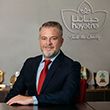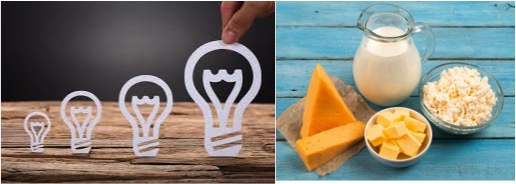It can be hard to keep up with the latest health and diet fads. One minute you’re opting for fat-free everything in the supermarket, the next you’re told to up your healthy fats because in fact sugar is the real enemy.
Eggs are in, eggs are out; carbs are bad, carbs are good – it’s all enough to make you order a takeaway and forget about making life improvements altogether.
But if there’s one advice that’s been pretty consistent over the years, it has to be the one on dairy. The latest Dietary Guidelines for Americans too consider dairy a core element of a healthy diet that consists of nutrient-dense foods and beverages across all groups such as vegetables, fruits, grains, protein foods and oils.
The 2020-25 guidelines suggest those who are two years and above consume two or three cups of dairy a day, depending on their age and intake of calories. A major source of calcium, dairy foods in this context mean milk – fat-free, low-fat or even lactose-free versions –yoghurt and cheese, along with fortified soy beverages and yoghurt as alternatives.
Gaby Amade, President, Middle East and Africa at Fonterra, which owns popular milk powder brands, Anchor and Anlene, couldn’t agree more.
“Milk is practically a superfood and should be a core part of a daily nutritious diet. There’s a unique combination of nutrients in dairy, and they play an important role in growing and maintaining healthy bones, immunity, the functioning of the nervous system (including the brain), helping to prevent tiredness, maintaining healthy eyes, and so much more.”
Fortunately, dairy remains at top of mind for many people when it comes to taking care of their health and wellbeing. A recent McKinsey report showed growth in demand for dairy in 2020 in the middle of the pandemic in the US across most categories, including a positive turn for fluid milk for the first time in four years.
Growing market

Wasfi Kaso
The UAE too seems to have followed a similar trend. “The UAE dairy products market is steadily growing,” says Wasfi Kaso, CEO of Emirates Food Industries, which owns National Dairy that recently launched Hayatna dairy products in the UAE. “The per-capita consumption of milk in the UAE is increasing.
“People have become more health-conscious; they are looking to develop their immunity and milk is essential in developing immunity. Consumers are more aware of the options available in the market, hence healthy and organic products are highly in demand. At the same time, value-added milk is on the rise in terms of demand.”
People’s focus on leading healthier lifestyles and demand for healthier products prompted Al Rawabi Dairy Company to launch new products during the pandemic.

Prof. Dr Ahmed El Rahim
“We launched two new functional products during Covid-19 – Protein Plus Milk and the Immu boost portfolio with zinc, probiotics and vitamins that strengthen immunity and help in the fight against Covid-19,” says Prof. Dr Ahmed El Tigani Abdel Rahim, CEO, Al Rawabi Dairy Company. These add to its portfolio of health-supporting dairy products such as Nutree Boost, Vitamin D Milk and the Super Milk range fortified with an array of vitamins and nutrients comprising vitamins A, D, E, calcium and folic, in addition to its core fresh milk, laban and yoghurt products.
Innovations and good practices have been at the core of the dairy sector, allowing players to set themselves apart.
“Fonterra uses pasture-based farming methods where grass-fed cattle roam freely on New Zealand’s farms for almost 365 days of the year,” says Amade, whose company supplies a full range of dairy products and ingredients to F&B outlets and major food manufacturers. “This leads to well-cared for, healthier, happier cattle that live longer and use less vital resources like water and energy, compared to other methods. Fonterra also has very low use of antibiotics in dairy cows, and some of the lowest somatic cell counts in the world, meaning the milk is of very high quality. No Fonterra cows are given hormones to produce extra milk – in fact, this practice is banned in New Zealand dairy farming.”
Meanwhile, Al Rawabi, which operates locally, ensures milk goes from farm to table in just 24 hours. “Every day, in our farm, we collect between 250,000 and 270,000 litres of milk,” explains Prof. Rahim. “Our milk undergoes a process of pasteurisation, homogenisation, standardisation and fermentation, aimed at making the milk free from bad bacteria and improving the taste of the products. We ensure that each cow can absorb the needed amount of nutrients in each bite, which includes high-quality forages, a balanced grain and protein diet, as well as vitamins and minerals, to improve the quality and the taste of the milk.”
Dairy companies have also stepped up efforts to reduce their environmental footprint as they become more aware.
Al Rawabi recently launched a biogas facility to transform organic waste from its fields into clean energy, with a total capacity of 1.3 megawatts of green electricity. It uses this energy for the company’s operations. “As we are the biggest local farm and the first self-contained farm in the UAE, with 17,000 cows, we have taken care of our environment and social responsibility. We are now closer to our goal of a greener future and this project has led us towards the circular economy and reduced environmental footprint. Clean nature, care for the environment, ecology, recycling, and sustainability are all Al Rawabi milestones.”
Source : Gulf news June 28th 2022 by Emma procter

